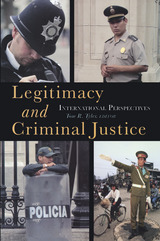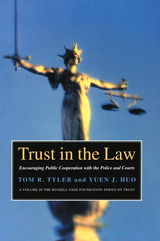2 books by Tyler, Tom R.

Legitimacy and Criminal Justice
An International Perspective
Tom R. Tyler
Russell Sage Foundation, 2007
The police and the courts depend on the cooperation of communities to keep order. But large numbers of urban poor distrust law enforcement officials. Legitimacy and Criminal Justice explores the reasons that legal authorities are or are not seen as legitimate and trustworthy by many citizens. Legitimacy and Criminal Justice is the first study of the perceived legitimacy of legal institutions outside the U.S. The authors investigate relations between courts, the police, and communities in the U.K., Western Europe, South Africa, Slovenia, South America, and Mexico, demonstrating the importance of social context in shaping those relations. Gorazd Meško and Goran Klemencic examine Slovenia's adoption of Western-style "community policing" during its transition to democracy. In the context of Slovenia's recent Communist past—when "community policing" entailed omnipresent social and political control—citizens regarded these efforts with great suspicion, and offered little cooperation to the police. When states fail to control crime, informal methods of law can gain legitimacy. Jennifer Johnson discusses an extra-legal policing system carried out by farmers in Guerrero, Mexico—complete with sentencing guidelines and initiatives to reintegrate offenders into the community. Feeling that federal authorities were not prosecuting the crimes that plagued their province, the citizens of Guerrero strongly supported this extra-legal arrangement, and engaged in massive protests when the central government tried to suppress it. Several of the authors examine how the perceived legitimacy of the police and courts varies across social groups. Graziella Da Silva, Ignacio Cano, and Hugo Frühling show that attitudes toward the police vary greatly across social classes in harshly unequal societies like Brazil and Chile. And many of the authors find that ethnic minorities often display greater distrust toward the police, and perceive themselves to be targets of police discrimination. Indeed, Hans-Jöerg Albrecht finds evidence of bias in arrests of the foreign born in Germany, which has fueled discontent among Berlin's Turkish youth. Sophie Body-Gendrot points out that mutual hostility between police and minority communities can lead to large-scale violence, as the Parisian banlieu riots underscored. The case studies presented in this important new book show that fostering cooperation between law enforcement and communities requires the former to pay careful attention to the needs and attitudes of the latter. Forging a new field of comparative research, Legitimacy and Criminal Justice brings to light many of the reasons the law's representatives succeed—or fail—in winning citizens' hearts and minds. A Volume in the Russell Sage Foundation Series on Trust
[more]

Trust in the Law
Encouraging Public Cooperation with the Police and Courts
Tom R. Tyler
Russell Sage Foundation, 2002
Public opinion polls suggest that American's trust in the police and courts is declining. The same polls also reveal a disturbing racial divide, with minorities expressing greater levels of distrust than whites. Practices such as racial profiling, zero-tolerance and three-strikes laws, the use of excessive force, and harsh punishments for minor drug crimes all contribute to perceptions of injustice. In Trust in the Law, psychologists Tom R. Tyler and Yuen J. Huo present a compelling argument that effective law enforcement requires the active engagement and participation of the communities it serves, and argue for a cooperative approach to law enforcement that appeals to people's sense of fair play, even if the outcomes are not always those with which they agree. Based on a wide-ranging survey of citizens who had recent contact with the police or courts in Oakland and Los Angeles, Trust in the Law examines the sources of people's favorable and unfavorable reactions to their encounters with legal authorities. Tyler and Huo address the issue from a variety of angles: the psychology of decision acceptance, the importance of individual personal experiences, and the role of ethnic group identification. They find that people react primarily to whether or not they are treated with dignity and respect, and the degree to which they feel they have been treated fairly helps to shape their acceptance of the legal process. Their findings show significantly less willingness on the part of minority group members who feel they have been treated unfairly to trust the motives to subsequent legal decisions of law enforcement authorities. Since most people in the study generalize from their personal experiences with individual police officers and judges, Tyler and Huo suggest that gaining maximum cooperation and consent of the public depends upon fair and transparent decision-making and treatment on the part of law enforcement officers. Tyler and Huo conclude that the best way to encourage compliance with the law is for legal authorities to implement programs that foster a sense of personal involvement and responsibility. For example, community policing programs, in which the local population is actively engaged in monitoring its own neighborhood, have been shown to be an effective tool in improving police-community relationships. Cooperation between legal authorities and community members is a much discussed but often elusive goal. Trust in the Law shows that legal authorities can behave in ways that encourage the voluntary acceptance of their directives, while also building trust and confidence in the overall legitimacy of the police and courts. A Volume in the Russell Sage Foundation Series on Trust
[more]
READERS
Browse our collection.
PUBLISHERS
See BiblioVault's publisher services.
STUDENT SERVICES
Files for college accessibility offices.
UChicago Accessibility Resources
home | accessibility | search | about | contact us
BiblioVault ® 2001 - 2024
The University of Chicago Press









